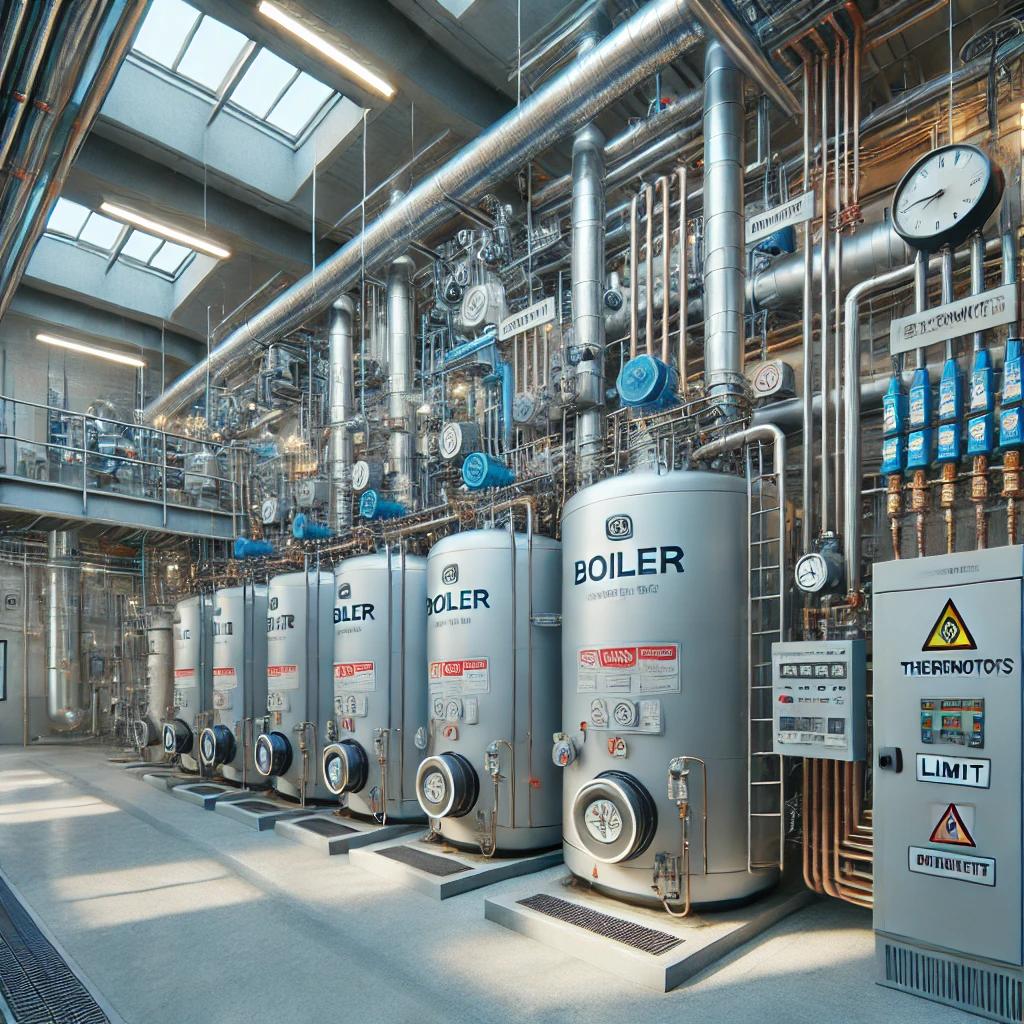What is a Boiler Room? How is Its Installation Done?

What is a Boiler Room? How is Its Installation Done?
A boiler room is a structure that converts the chemical energy from burning solid, liquid, or gas fuels into heat energy. This energy heats various fluids to provide heating for desired areas.
The efficiency of boilers is directly related to how far the heat produced during combustion can be transferred. Therefore, maximizing the use of the heat generated is essential. By doing so, fuel consumption is minimized, the amount of waste gases released into the atmosphere is reduced, and labor costs for the boiler are decreased.
Key Considerations in Boiler Rooms
Boiler rooms must be designed to operate with maximum efficiency. Some critical points to consider include:
Distance in Front of the Boiler
There should be sufficient space in front of each boiler to allow for the repair of flue pipes. This distance is recommended to be at least 1 meter longer than the boiler's length.
Distance Between Boilers
The boilers should be at least 70 cm away from walls and other equipment. If there are multiple boilers, the distance between them should be at least 50 cm.
Ceiling Height
The ceiling height of the boiler room should not be less than 2.5 meters.
Height Above the Ground
Boilers should be placed on a concrete platform at least 10 cm above the ground to prevent damage from water leaks.
Boiler Room Ventilation Guidelines
Proper ventilation is crucial in boiler rooms, especially during the winter months when they are used intensively, to ensure the health of the workers. The key ventilation rules include:
Combustion Air
The burner must have the necessary combustion air supply. Additionally, upper ventilation grilles should be in place to remove gas leaks or unburned exhaust gases.
Ventilation Openings
The openings for lower and upper ventilation must never be obstructed. It is recommended to position the lower ventilation at burner level and the upper ventilation near the ceiling.
Short-Circuit Risks
The lower and upper ventilation openings should not be close to each other, as this can cause a short-circuit airflow, affecting burner efficiency.
Connection to the Outside Environment
Ventilation openings should not be directly connected to the outside. If possible, these areas should be supported by ventilation ducts.
Electrical Installation Rules in Boiler Rooms
Electrical issues in boiler rooms can pose significant health and safety risks. The main rules to follow are:
Electrical Panels
Only panels related to the boilers should be present, and these panels must be of ETANJ type with EX-PROOF features.
Lighting
Lighting systems should be mounted 50 cm below the ceiling. If the electrical distribution panel is located outside the boiler room, the EX-PROOF feature is not mandatory.
Fan Motors
In boiler rooms with forced ventilation, the fan motor should work in conjunction with the burner control system. In case of malfunctions, the burner must automatically shut down.
Grounding
Every boiler room must have a dedicated grounding system that does not exceed 20 ohms. A single grounding line is sufficient for both the boiler and steel chimneys.
Flue Connection Rules in Boiler Rooms
Flue connections are critical components in boiler room installations. The rules include:
Flue Channel Length
The length of the flue channel should not exceed a quarter of the flue height. Otherwise, flue draft efficiency decreases, and combustion settings may not be adjusted properly.
Flue Connections
The distance between the flue and boiler should be equal to the width of the boiler, avoiding directional changes as much as possible.
Independent Connections
Each boiler must be connected to a separate flue. Devices like water heaters, combi boiilers, or generators must not share the same flue as the boiler.
Cleaning and Drainage
There must be a cleaning cap at the bottom of the flue, and a drainage system should be added for gas-fired boilers.
Factors That Could Cause Explosions in Boiler Rooms and Precautions
Potential explosion risks in boiler rooms and their precautions include:
Ventilation Blockages
Blocking upper ventilation grilles increases the risk of explosions in the event of a gas leak.
Wet Surfaces
The walls and floors of the boiler room should remain dry, and natural gas pipeline components should be cleaned with a dry cloth.
Limit Thermostats
In addition to the standard thermostat, a limit thermostat should be installed.
Burner Inspections
In case of malfunctions, authorized service personnel must be contacted, and the burner flame color should be observed before leaving the boiler room.
Voltage Drops
In the event of a power outage, the burner should automatically shut off.
Causes of Explosions in Coal-Fired Boilers
Some factors leading to explosions in coal-fired boilers include:
Closed Valves
Keeping the hot water return and supply valves closed can cause pressure buildup, leading to explosions.
Lack of Water
When the boiler runs out of water, the surface temperature rises excessively. If water comes into contact with the overheated surface, it may cause an explosion. Tap water should not touch the boiler surface directly.
